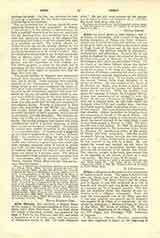

Abbon (or ABBO), Saint, b. near Orleans c. 945; d. at Fleury, November 13, 1004, a monk of the Benedictine monastery of Fleury sur Loire (Fleuret), conspicuous both for learning and sanctity, and one of the great lights of the Church in the stormy times of Hugh Capet of France and of the three Ottos of Germany. He devoted himself to philosophy, mathematics, and astronomy. In early life he was called to England to direct the school of the newly founded monastery of Ramsey, in the County of Huntingdon, after which he returned to Fleury. On the death of the Abbot Oilbold, Abbon was elected to succeed him, but one of the monks who had secured the support of the King and his son Robert, the Bishop of Orleans, contested the choice, and the matter assumed national importance in the political forces it brought into play. It was finally settled by the famous Gerbert (later Pope Sylvester II) in favor of Abbon. He was present at the Synod of St, Basolus (St. Basle), near Reims, at which Archbishop Arnolf was tried for treason and deposed, to make way for Gerbert. When the question arose about the marriage of Robert the Pious and Bertha, Abbon, was commissioned to arrange it with the Pope. On the way to Rome he met Pope Gregory V, who was a fugitive from the city from which the Antipope John XVII had expelled him. Between the Pontiff and the Abbot the greatest esteem and affection existed. The royal petition for a dispensation was rejected. Abbon succeeded in bringing about the restoration of Arnolf to the see of Reims. His influence contributed largely to calm the excitement about the fear of the end of the world which is said to have been general in Europe in 1000. His glorious life had a sad ending. In 1004 he attempted to restore discipline in the monastery of La Reole, in Gascony, by transferring some of the monks of Fleury into that community. But the trouble increased; fighting began between the two parties, and when St. Abbon endeavored to separate them he was pierced in the side by a lance. He concealed the wound and reached his cell, where he died in the arms of his faithful disciple Aimoin, who has left an account of his labors and virtues. The miracles wrought at his tomb soon caused him to be regarded in the Church of Gaul as a saint and martyr. His feast is kept November 13.
T.J. CAMPBELL

